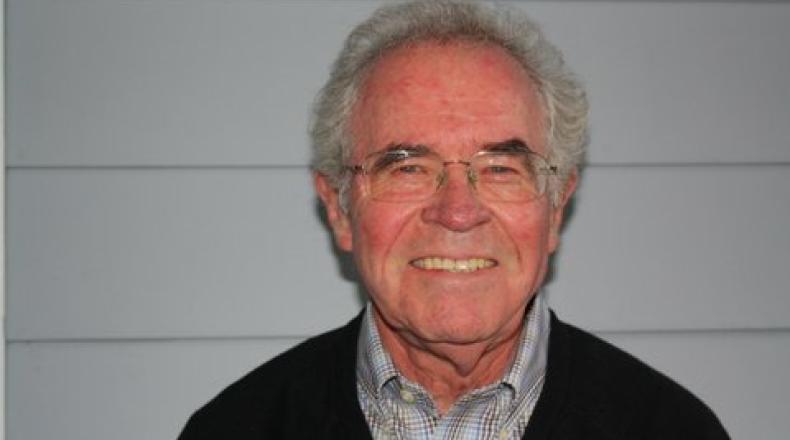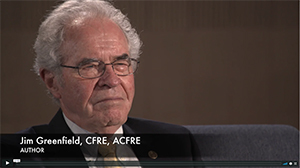AFP Member Spotlight: James (Jim) Greenfield, ACFRE, FAHP, FAFP

September 25, 2018
Bonus! From the AFP International Conference on Fundraising in San Antonio, Amy Eisenstein interviews Jim Greenfield about donor retention, the Fundraising Effectiveness Project and tools you can use to improve your fundraising.
Q: How long have you been in fundraising? In AFP?
I have been in the fundraising profession for 55 years, and a member of AFP since 1969.
Q: Tell me a little about your career arc. Did you start out as a fundraiser?
A: I started out as Assistant PIO, University of California, Riverside, after a tour in America’s Navy. I launched comprehensive fundraising programs at four hospitals, including the Cleveland Clinic Foundation, New England Baptist Hospital, University Hospital/Boston University Medical Center and Children’s Medical Center, Boston. I also worked as part of the fundraising staff at three Universities: the Claremont Colleges, Claremont University Center; California Institute of Technology; and the University of California, Riverside. I retired from Hoag Memorial Presbyterian Hospital in February 2001 after 14 years as senior vice president, resource development and as executive director, Hoag Hospital Foundation, where more than $150 million was raised during my tenure.
Q: You’re among the first to tackle measuring fundraising performance for effectiveness and efficiency. You served as adjunct faculty of The Fund Raising School at Indiana University until 2015. Additionally, you have remained actively involved in the advancement of our profession as a writer, speaker, educator, advisor and mentor. What are you most proud of in your career at this point—key accomplishments, achievements, etc.?
I’m proud of the opportunity to start and grow fundraising programs and evaluate how they fit into the philanthropic environment of their community.
Q: You’ve been selected as a 2018 AFP Distinguished Fellow. Congratulations. What went through your mind when you first heard the news?
A: Quite a surprise—a very nice surprise! I found out later how it happened: through members of my new chapter in Washington with my nomination submitted by Jan F. Brazzell, PhD, ACFRE.
Q: When you think about how fundraising has changed over the time you’ve been in the profession, what stands out the most to you?
A: A lot of it has NOT changed at all. The basic principles and concepts are applied by organizations all over the world using the established methods. The introduction of new techniques, namely the Internet and the application of online fundraising, is becoming common practice. This new interface allows us to communicate with lots of people for free, and it’s a personal communication. We are a growing profession. We must continue to move forward, integrating all these ways of communicating with donors and prospects in our community.
Q: You have worn many hats in your career. Do you have a specialty or type of fundraising you most enjoy?
A: Performance evaluation in fundraising. Evaluating our results is so critical! Understanding how it happened, and then using that information to improve results. We work hard to cultivate and invite gifts, grants and contributions. We’re not as good at maintaining positive relationships with current donors, which is so valuable to our organizations.
Q: What’s the most challenging issue the profession faces right now?
A: Anxiety and uncertainty touches philanthropy. For example, public trust in a nonprofit is essential for public support from the community. One issue of great concern is politics covering so much of everyday lives, and the uncertainty of it. “Fake news” disrupts public trust. The public must trust the nonprofit organization to use their contribution to benefit others.
Q: Advice for a professional fundraiser wanting to get into management and senior leadership?
The fun is in fundraising, not management. If you are committed to being a fundraiser, enjoy the relationships and stay with that. When you move into management, you’re caught in the politics of the institution and can be consumed with budgets, human resources, and management meetings. As you move up the ladder, you will get to do less fundraising. If you find satisfaction working with Boards, volunteers, prospective and existing donors – stay there and become the best major gift officer, events manager, annual fund director, planned gift officer, grant writer you can be!
Q: You must have some secrets, or just tried-and-true pieces of wisdom, that work for you. Care to share any?
A: Money follows people. It’s the people – individual, corporate, foundations – where fundraising should focus. Not just on the money. Today’s focus on major gifts is too much about the money and not enough about the people. Build a base of engaged prospects and donors who are committed to your organization and its mission.
Q: What do you think AFP and the profession can do to encourage individuals from under-represented groups to consider fundraising?
A: There are two sides to that question. Encouraging diversity among fundraising staff will take work and lots of time. AFP is leading the way today, helping boards and management to understand their own leaders, volunteers, donors and their employees also must reflect the diversity of those they serve.
Q: You’ve helped mentor several fundraisers. What do you love most about mentoring young professionals?
A: Helping them to understand the nature of the craft – the methods and techniques of fundraising. It’s important that we position fundraisers so they are ready to work together and for their organization. That means helping them appreciate and understand what to do, how we do it, and how to make it successful—and fitting that into the institution’s financial priorities and mission priorities.
Q: You remain a member of the AFP Growth in Giving Steering Committee and the Fundraising Effectiveness Project Working Team, as Chair of the AFP Fundraising Effectiveness Project Glossary of Terms Task Force. What are some other ways you stay engaged with AFP?
A: I stay engaged through my Chapter. I have served on AFP Chapter Boards in Los Angeles and Massachusetts and on the AFP Board of Directors (1979 – 1988) and Research Council (1996 – 2002), as well as several terms on the AFP Foundation for Philanthropy Board (1982 – 2001). I’m a three-term board member and Past President (2000) of the AFP California Orange County Chapter. Today, I’m a member of the AFP South Sound (WA) Chapter Education Committee, and a member, mentor and educator for AFP South Sound, as well as AFP International.
Q: What’s it like being one of 111 individuals in the world who has earned the Advanced Certified Fundraising Executive (ACFRE) certification?
A: Lonely! I responded to Russ Raker’s invitation in 1991 to help design the ACFRE exam and write questions. It’s also a fantastic learning experience to go through the process, and I encourage everyone to consider it!
Q: How do you manage to balance your personal and professional life?
A: Personal and professional balance requires a most understanding and generous spouse.
Q: You are the author/editor of 10 books and more than 40 articles and chapters on fundraising management. What do you like to do in your spare time?
A: Backpacking and fishing in the California High Sierra.
Q: What’s the last book read?
A: O. Henry’s collected shorts stories.
Q: How would you like to be remembered?
A: I happened to come along at a time when fundraising was emerging and taking off as a profession. I got to be part of its growth and to enjoy the ride!
Q: Anything else you would like to add?
A: What we do is called fundraising. We should not be afraid to call ourselves fundraisers and be recognized for what we are: fundraisers! Be proud of what you do and who you are.
